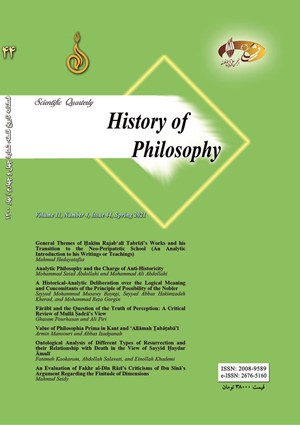-
-
List of Articles
-
Open Access Article
1 - Editor's Note
Hossein Kalbasi Ashtari -
Open Access Article
2 - Outline of Ḥakīm Rajab‘alī Tabrīzī’s Works and Transition to the Neo-Peripatetic School (An Analytic Introduction to his Writings or Teachings)
Mahmoud Hedayatafza -
Open Access Article
3 - Analytic Philosophy and the Charge of Anti-Historicity
Mohammad Saeid Abdollahi Mohamad Ali Abdollahi -
Open Access Article
4 - A Historical-Analytic Deliberation over the Logical Meaning and Concomitants of the Principle of Possibility of the Nobler
Seyyed Mohammad Musawy Seyyed Abbas Hakimzadeh Kherad Mohammad Reza Gorgin -
Open Access Article
5 - Fārābī and the Question of the Truth of Perception: A Critical Review of Mullā Ṣadrā’s View
Ghasem Purhasan Ali Piri -
Open Access Article
6 - Value of Philosophia Prima in Kant and ‘Allāmah Ṭabāṭabā’ī
Armin Mansouri Abbas Izadpanah -
Open Access Article
7 - Ontological Analysis of Different Types of Resurrection and their Relationship with Death in the View of Sayyid Ḥaydar Āmulī
Fatemeh Kookaram Abdullah Salavati Einollah Khademi -
Open Access Article
8 - An Evaluation of Fakhr al-Dīn Rāzī’s Criticisms of Ibn Sīnā’s Argument Regarding the Finitude of Dimensions
Mahmoud Saidiy
-
The rights to this website are owned by the Raimag Press Management System.
Copyright © 2017-2026







